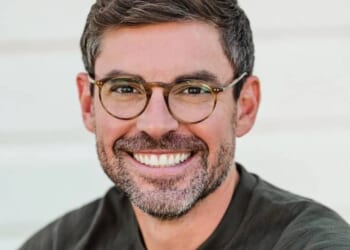Angélica Herrera, a homemaker in her 40s, voted to elect Ecuador’s next president on Sunday not because she loves incumbent Daniel Noboa’s vision, but precisely because of how difficult she feels life in Ecuador has become.
“I had to choose the lesser evil,” says Ms. Herrera, who over the past year has been exhausted by 14-hour blackouts and an escalating security crisis that has made her fearful of walking on her own in the formerly sleepy streets of Quito.
“We’re invaded by crime and drug terrorism. We’re not doing well,” she says. “We hope our country will change.”
Why We Wrote This
Ecuadorians are unhappy with their security and economic crises – and yet, they reelected President Daniel Noboa. It bucks an anti-incumbent trend, but is telling in a region cozying up to iron-fisted approaches to violence and crime.
Incumbents around the globe have been punished at the polls since the pandemic – and in Ecuador, no president has been reelected in more than a decade. And yet, Mr. Noboa secured 56% of the ballots in the second-round presidential vote April 13, with his opponent, leftist Luisa González, winning 44%.
Mr. Noboa’s tough-on-crime policies, political alignment with U.S. President Donald Trump, and voter skepticism about Ms. González’s ability to address Ecuador’s security and economic crises paved the way for his reelection. His victory could serve as a bellwether for upcoming elections across the region, where voters face rising insecurity and weigh how candidates navigate ties with Mr. Trump.
Three in 5 Ecuadorians say their personal security and economic situations have not improved under Mr. Noboa’s short first term in office. He was elected in 2023 snap elections, with less than a year and a half to prove himself before his reelection bid. And although insecurity has been on the rise under his watch – the first two months of 2025 were Ecuador’s most deadly on record – Mr. Noboa’s militarized approach to criminal organizations has earned him voter confidence.
His victory is in many ways a reflection of tensions playing out across the region. As crime and violence grow, electorates from the Southern Cone to Central America are leaning into models that create calm through mano dura, or “iron fist,” security policies. These policies often restrict citizen rights in the name of being tough on crime. In Ecuador, Mr. Noboa has brought “state of emergency” decrees, which restrict freedom of movement, squarely into his crime-fighting toolbox. He declared one in seven states the day before his reelection.
“The vote was not objective; it was emotional,” says Renato Rivera, director of the Ecuadorian Observatory on Organized Crime. “It’s not that citizens have confidence in Noboa’s security strategy or that it has worked, but it’s a reflection of” the desire for it to work, he says of the growing popularity of hard-line security policies here and regionwide.
Popular security strategy – without results?
In October 2023, Mr. Noboa became Ecuador’s youngest elected president after conservative President Guillermo Lasso dissolved parliament amid impeachment charges. A relatively unknown son of a banana tycoon, Mr. Noboa won with 51.8% of the vote to Ms. González’s 48.1%, just weeks after another presidential candidate, Fernando Villavicencio, was murdered on the campaign trail, underscoring growing insecurity.
Ecuador, once among the region’s most peaceful countries, saw its homicide rate soar from 6.9 per 100,000 in 2019, to 45.1 in 2023 – more than a sixfold increase, driven partly by expanding drug trafficking routes.
Over his first term of 18 months, Mr. Noboa weathered bloody prison riots, more than a dozen masked men storming a public television channel waving guns and explosives during a live broadcast, a sluggish economy with debt amounting to over half of the gross domestic product, and an electricity crisis due to a drought that emptied hydroelectric dams last year.
Security was voters’ top concern Sunday.
Mr. Noboa’s security strategy “has not worked,” says Mr. Rivera, from the security think tank. Homicides may have dropped 18% between 2023 and 2024, which some attribute to Mr. Noboa’s crackdown on gangs, but Mr. Rivera says that had more to do with the consolidation of criminal groups than with policy. Meanwhile, kidnappings and extortion have surged. And the first two months this year were the bloodiest in Ecuador’s history, with more than one person killed every hour, according to data from Ecuador’s Ministry of Interior.
Mr. Noboa has proposed constitutional changes to allow foreign military bases in Ecuador, laying the groundwork for the United States to lend a hand in fighting insecurity here. And a week before the vote, Mr. Noboa hosted Erik Prince, the founder of U.S. security contractor Blackwater to potentially assist law enforcement. He declared a 60-day state of emergency on the eve of the election in seven of 24 provinces, suspending legal protections against warrantless search and entry of homes, limiting public gatherings, and imposing a nightly curfew in some cities.
“Benefit of the doubt”
Mr. Noboa is borrowing from the hard-line playbook of El Salvador’s President Nayib Bukele, who has won accolades for slashing some of the region’s worst homicide rates. But the Salvadoran president has locked up nearly 1.7% of the country’s adult population in the process, often without due process.
Ecuador’s population is nearly three times larger than that of El Salvador, and its criminal networks are more transnational. Leaders across the region are watching Ecuador’s mano dura experiment closely: In neighboring Colombia violence is spiraling despite President Gustavo Petro’s promises of total peace, and next year’s presidential elections could replace a leftist former guerrilla with a right-wing tough-on-crime challenger.
Regional leaders are also watching Mr. Noboa’s rapport with U.S. President Trump. After a clash between Colombia’s leftist President Petro and Mr. Trump in January, which prompted threats of up to 50% tariffs and U.S. visa revocations, “Ecuadorians were not willing to take that risk” of seeing how a leftist leader like Ms. González would manage relations with Mr. Trump, says Beatriz García Nice, an Ecuador expert.
Mr. Noboa was one of the few Latin American leaders to attend Mr. Trump’s inauguration, and he visited him last month at his Mar-a-Lago resort. The U.S. president’s return to power has pushed voters in Latin America to prioritize geopolitical pragmatism over ideology, says Ms. García Nice.
Typically, being in office when crises hit is a recipe for a political party to get booted from office, according to a global study by the Pew Research Center. But “Voters have given [Mr. Noboa] the benefit of the doubt,” says Juan Rivadeneira, an Ecuadorian economist and political consultant.
Mr. Noboa promotes a “new Ecuador,” which he contrasts with the opposition’s “old Ecuador,” full of corruption. He has a presence on Instagram and TikTok, and appeals to Ecuador’s young electorate, whose average age is just 28.
“Noboa managed to engage and connect with young people. He and his wife [a wellness influencer] have created something for young people to aspire to,” says Renato Solines, an Ecuadorian businessman.
But this election was also about what voters want to avoid. Mr. Noboa “mobilized fear,” says Mr. Rivadeneira – around not only security threats, but also more quotidian issues, such as Ecuador’s dollarized economy.
But Mr. Noboa’s path ahead will be steep. Even if he can rein in crime or revive the economy, voters may boot him out in four years, as with other incumbents in the region.










